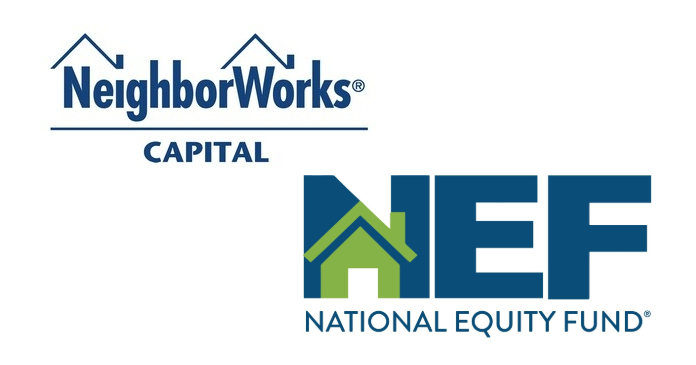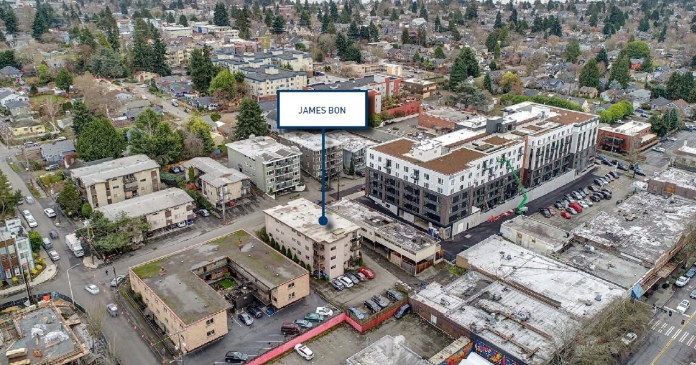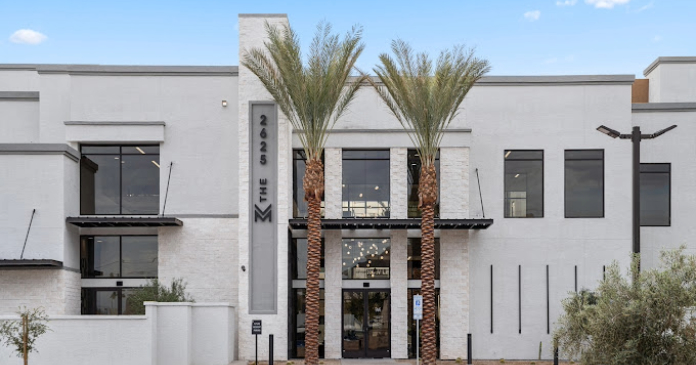Rick Graf believes in good, old fashioned hard work. “If you work hard, you will get ahead and, if you are smart and stay out of trouble and do the right thing, you will be rewarded.”
“That’s certainly been the case in my career and I’ve been blessed beyond my wildest imagination,” said the president and CEO of Dallas-based Pinnacle.
Graf formed his “old school” work ethic growing up in Indiana, where he worked part-time as a teenager picking up trash and changing light bulbs at an apartment community.
“I was a porter, or junior maintenance man, if you will. I started in the business many years ago and I hate to admit it, but next month it will be nearly 40 years,” Graf said in September.
His penchant for hard work throughout those years helped him progress from doing odd jobs at an apartment community to head of the nation’s fourth largest fee-management company, but being in the right place at the right time with the right associations certainly didn’t hurt.
“I’ve been fortunate in my career to work with a lot of people that have seen something in me and given me the opportunity to do additional things,” he said.
Graf’s most recent opportunity presented itself in August, when the management team of Dallas-based Pinnacle purchased the firm’s property management business from its founders, John Goodman and Stan Harrelson, in a transaction made possible by an investment from a subsidiary of long-time partner and client El Paso-based Hunt Companies, Inc.
The stage for this change was set years ago, when the founders slowly began to step away from Pinnacle’s day-to-day operations to focus on other projects, leaving company responsibilities to COO Larry Goodman, EVP Eric Schwabe, CFO John Carrosino and President Rick Graf, who, would also assume the role of CEO formerly held by Harrelson.
As the founders’ involvement in Pinnacle’s business lessened, Graf and his team members opened discussion with them about the company’s future.
“Frankly, it was a very respectful, healthy conversation—maybe awkward at times, because that’s the nature of the conversation—to come to the point where we considered every alternative.
“The founders had a great fondness for the legacy of the organization they built over the past 34 years and they really wanted to see it move forward. They liked how the management team had grown and significantly evolved the company and wanted us to have the opportunity to put a plan together that would enable us to buy out their interest,” said Graf.
The investment from Hunt Company was the linchpin. While Graf would not discuss percentages of ownership, he confirmed that Hunt’s investment enabled the executive team to buy Pinnacle’s management contracts and service business.
“We’ve known Hunt for many, many years. We’ve partnered with them in the military space and have done third-party work for them through subsidiary companies they’ve been involved with, most notably Centerline and Capmark.
“They’ve seen what our management team has done and they like how we run the business, which is accretive to what they do. They are now looking to us to continue to do the great things that we are doing organizationally,” he said.
Pinnacle, in essence, remains the same. “We like to say it’s a ‘no change, change’ and all the systems, procedures, office locations, all the senior management, all the key players, everything stays the same. It’s just simply creating a new holding company to manage the business,” said Graf.
The beginning
Pinnacle’s story began in 1980, when Goodman launched Goodman Management Company in Seattle as a vehicle for his personal property management investments and was joined five years later by Harrelson, who brought to the firm a vision for national growth.
Goodman Management became Goodman Financial Services (GFS) and, in 1994, expanded further when the company’s West Coast clients revealed the need for services in other markets across the country following the savings and loan crisis. To gain a needed national footprint, GFS partnered with Phoenix Realty, acquired Houston-based Sovereign National Management Company and chose the company’s current name—Pinnacle.
Graf joined Pinnacle in 1996 and served as Central Region president, responsible for management of 60,000 units throughout the South Central and Midwestern regions until 2008, when he was chosen to succeed Harrelson as president of the entire company, while Harrelson continued to hold the CEO post and singularly focus on Pinnacle’s growth, including a foray into Tokyo, Beijing and other international markets.
Although the economy was beginning to falter in 2008, Graf’s ascension to company president heralded a new era for Pinnacle that included moving headquarters to Addison, Texas, a spotlight on attracting talent and client-centric initiatives focused on customer service and an expansion of technological offerings like revenue management, mobile applications and upgraded online interface, leasing and service requests.
“Throughout the downturn, we invested in our performance and our people so that when the markets began to recover we would be in a great position. We evolved our portfolio and are much more institutionally focused today than we were six or seven years ago, with probably 65 percent of our portfolio now owned by major institutions.
“We invested in training, marketing and technology and, most importantly, our team members. We continued to raise the bar in all of those areas, which is a little difficult to do in tough financial times. But I think it’s been the right thing to do and it’s paid dividends as we’ve come off of the recession,” said Graf.
Part of the company’s recession strategy was to reduce Pinnacle’s size by shedding businesses that were no longer useful. In 2010, Pinnacle was the nation’s largest fee-manager in terms of managed units. Today, it is number four on the National Multi Housing Council’s (NMHC) top 50 managers list.
The right size
With the economy in a slow, albeit almost jobless, recovery, Pinnacle isn’t looking to be the biggest management company, just the best. “Our approach has been, and continues to be, to expand our business with our existing clients, largely in the institutional space,” said Graf.
Although he recognizes the economies that come with scale, he thinks Pinnacle’s perfect size is in the neighborhood of 125,000 to 150,000 units.
“Pinnacle is currently at 135,000 units, a little less than our highest targeted number, but we have some growth opportunities and our goal is really to be more client-centric. We’re concerned with how we can better serve the needs of our clients and for the past few years focused heavily on helping our clients acquire properties and build their portfolios around the country and provide a high level of service to them and great returns on their investments,” he said.
Pinnacle is targeting five markets for growth where the company has relatively modest portfolios—Atlanta, Houston, Chicago, Denver and Phoenix.
“We’ve grown our Atlanta portfolio significantly from maybe 1,000 units to close to 4,000 units in the past 12 to 18 months. And, while we’ve always had a presence in Houston, we are really trying to grow in that locale. We recently established an office in downtown Chicago and hired a professional there, although we’ve managed in and around Chicago for years. In the other two markets—Denver and Phoenix—our focus is to grow our presence and provide services on a broader scale.
“I think growth will primarily be organic but, if you look at our footprint, the obvious area where we don’t have a presence is in the Northeast. We’ve looked at opportunities to expand through acquisition of a smaller regional player in that market and certainly have a desire to do that.
“The timing of that expansion remains to be seen, but that is certainly part of our growth strategy versus going in there on a one-off basis and trying to slug it out and build a portfolio. It may make more sense to acquire someone than to build a portfolio organically,” he said, noting that some growth opportunities have come to his firm since the Greystar/Riverstone merger, from clients who are taking a wait-and-see approach to Greystar’s now megalithic size.
“Pinnacle shares clients with both of those firms, now the combined firm, and a number have said ‘it’s not that we don’t like one or the other, there’s just an element of uncertainty throughout so we may go to other providers, Pinnacle being one of them.’
“There have been some opportunities that have come our way and we expect that there will be more while Greystar sorts out the task of integrating systems and people. It’s a huge undertaking,” said Graf, who thinks the trend toward industry consolidation will continue over the next few years, while there are still opportunities for portfolio and company acquisitions.
Customer-centric
With more than 3,000 employees, Pinnacle now operates in 225 markets in 35 states across the country, offering property management and development services, consulting and due diligence with regional representation in all its local markets for all types of clients—developers, high-net-worth individuals, investment groups and institutions.
Pinnacle also has a relatively modest commercial division managing between and four and five million sq. ft. of space and a very successful association management business (HOA), mostly on the West Coast, and a niche brokerage business for its clients.
“Our clients are always buying and selling, so we are able to put buyers and sellers together. If we can do that successfully as a service and create an opportunity and, ultimately a commission for ourselves, then it makes sense to do it,” said Graf.
Today, many of Pinnacle’s clients are in acquisition mode and the company is involved in more than 30 lease-ups across its various markets, helping clients underwrite properties and perform due diligence as part of the process. Value-add renovations are a big part of Pinnacle’s service business today for several reasons.
“One, during the downturn owners didn’t have the money to put back into their properties and, secondly, the market wouldn’t reward them in terms of higher rents, whereas today, the markets have improved and the reward and opportunity are both here.
“Two, we are seeing a whole wave of buyers coming in and part of their strategy is, ‘how can I take a property that is worth X and what can I do to it to invest capital and over time raise rents and increase the value by X plus’,” said Graf.
One such upgrade program was executed last year at the 770-unit Park Point North in Atlanta, where Pinnacle completed $2 million in exterior renovations and upgraded community amenities that boosted renewals by nine percent, rent rates by nearly seven percent and revenue by eight percent after taking over the management of the property.
Another was conducted at the 462-unit Wallingford Apartments in Houston, where Pinnacle implemented an aggressive Yieldstar revenue management system and trained and motivated the site staff, thereby increasing the total community income by $347,697, or 11.4 percent, NOI by $382,034, or 37 percent, and raising economic occupancy from 88 percent in 2012 to 94.6 percent in 2013.
“We are big believers in revenue management and have close to 50,000 units of our portfolio on the Yieldstar revenue management system today,” said Graf.
International interests
Since Harrelson first developed international business contacts more than five years ago, Pinnacle has nurtured a franchise relationship in Asia that has continued to evolve. “Specifically in China, where we are doing some consulting work through an affiliate,” said Graf.
Pinnacle also has consulted in the U.K., Mexico and Canada on traditional purpose-built apartments.
“All of those traditionally are for-sale markets, but our clients there are seeing the need for rental and are looking for companies like ours to help them and, to some degree, replicate that business model overseas or across borders. We are working more as a consultant at this point, but we see opportunities in those markets to grow and evolve,” said Graf.
Domestically, Pinnacle has significant affordable and senior housing portfolios that were developed and operated through the Section 42 tax credit program.
“We also have been involved in doing off campus housing for private owners and now are looking at some other niche opportunities within the multifamily space,” said Graf.
Graf sees the greatest need and demand for rental housing coming from the young and the old—the student and the senior housing sectors. “Obviously we have an aging population and providing quality housing for our seniors is a great opportunity. There is a lot of development activity occurring and a lot of companies are trying to figure out how to meet that need.
“The student space is a little more mature in terms of companies that have come into and specialized in that space, but we still see there are a lot of opportunities there, maybe through some public/private ventures.
“I know our friends at Hunt are doing some things with a couple of universities and, hopefully, we can be in a position to provide services for those developments and some of that higher education living need,” said Graf.
The job ahead
A big part of Graf’s job at Pinnacle is to build and retain a talented team, from maintenance workers to onsite managers to the executives, and he is well suited for the task. His family owned a construction business and building is in his blood, his legacy.
“My father was in the building business, my grandfather was in the building business and, in a different sort of way, I’m in the building business. I love to build, to develop people. I love to build and grow a company, build and grow a region, a specific property, see it grow and evolve and improve.
“I’ve learned that as long as I’m building—and there are always plenty of things to build—I’m very energized and focused on the future. I haven’t had the experience lately of slowing down because we’ve had a lot to do over the past few years at Pinnacle,” he said.
New technology and social media will play a large part in the future of the company.
For instance, Pinnacle relies on Yardi Voyager for its property management and account capabilities and is currently implementing Yardi’s marketing and leasing solution, RENTCafé, a marketing platform that supports full property Websites, online leasing and portals.
With RENTCafé, Pinnacle’s prospective renters will be able to view property photos, amenities and floor plans, submit an application, execute their leases and, once they become residents, log in to a resident portal and submit and track maintenance requests, pay rent and renew leases.
“I think the challenge ahead at Pinnacle will be focused on finding new ways to build, grow and evolve the company. How do we continue to be a company of choice for our clients, both from a social, as well as from a client standpoint? How do we create a culture that attracts and retains the best and brightest talent in the industry?” he said.
“The answer is largely cultural, and ultimately, it’s having the team members feel like they are part of the team with a vested interest, a voice and a seat at the table on how we organize and run the company.
“I think most people want that. Economics come into it, but I think more important than that, people want to influence the outcome and that is what we offer and those are the kind of people we are looking for,” said Graf.















